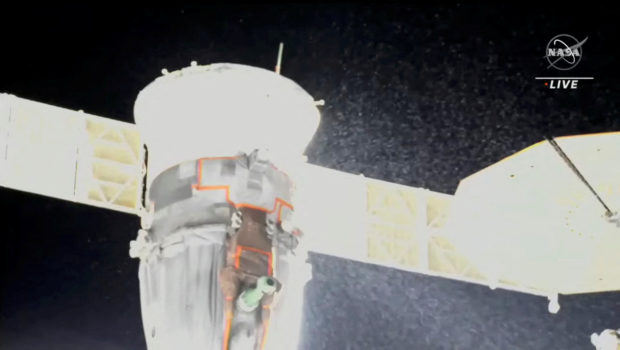Unexplained leak from docked Soyuz spacecraft cancels Russian ISS spacewalk

A stream of particles, which NASA says appears to be liquid and possibly coolant, sprays out of the Soyuz spacecraft on the International Space Station, forcing a delay of a routine planned spacewalk by two Russian cosmonauts December 14, 2022 in this still image taken from video. NASA TV/Handout via REUTERS
A routine spacewalk by two Russian cosmonauts aboard the International Space Station (ISS) was called off as it was about to begin after flight controllers noticed a stream of particles spewing from a docked Soyuz spacecraft, a NASA webcast showed.
The apparent leak, which was visible in NASA’s live video feed and appeared as a torrent of snowflake-like particles spraying from the rear section of the Soyuz MS-22 capsule, seemed to be liquid escaping from the spacecraft, possibly coolant, a NASA commentator said.
NASA said none of the seven members of the current International Space Station (ISS) crew – three Russian cosmonauts, three U.S. NASA astronauts and a Japanese astronaut – were thought to be in any danger.
The mishap occurred just before two of the cosmonauts, crew commander Sergey Prokopyev and flight engineer Dimitri Petelin, suited up for a planned spacewalk to move a radiator from one module to another on the Russian segment of the ISS.
An official for Russia’s mission control operations near Moscow was heard telling Prokopyev and Petelin in a radio transmission that their spacewalk was being canceled while engineers worked to determine the nature and origin of the leak.
The NASA commentator on the livestream, Rob Navias, broadcasting from NASA’s Johnson Space Center in Houston, also said the spacewalk was called off because of the leak, which began about 7:45 p.m. EST (0130 GMT Thursday).
He said the Soyuz craft arrived at the space station in September, bringing Prokopyev, Petelin and U.S. astronaut Frank Rubio to the ISS, and has remained attached to the Earth-facing side of the orbital laboratory outpost.
The spacewalk planned for Wednesday was postponed once before, in late November, because of faulty cooling pumps in the cosmonauts’ spacesuits, Navias said.
The spacewalk was to be the 12th this year at the ISS and the 257th in the history of the 20-year-old platform. Spacewalks are typically done for space station assembly, maintenance and upgrades, according to NASA.
Navias said it was too soon to know what implications the apparent leak might have for the future safety and operation of that spacecraft, and whether it might pose any difficulties for returning crew to Earth at the end of their mission.
The ISS, spanning the length of a U.S. football field, has been continuously occupied since 2000, operated by a U.S.-Russian-led partnership that includes Canada, Japan and 11 European countries.
RELATED STORIES
Astronauts smell smoke, burning on Russia’s ISS module
Ride-share return from space station on Russian Soyuz still on track — NASA